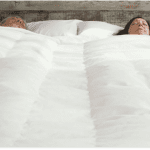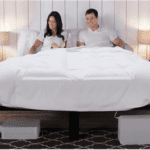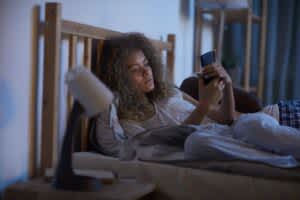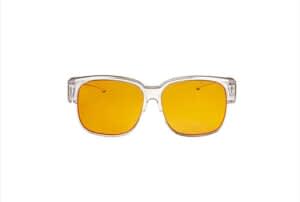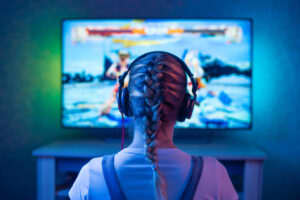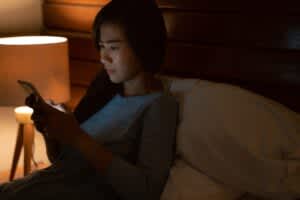Blue light is one type of light that is visible to the human eye. Blue light suppresses the production of melatonin, the main sleep hormone. This helps keep people awake during daylight hours, but it can also impact their ability to fall asleep.
Most blue light exposure comes from the sun. However, people are also exposed to blue light from other sources like fluorescent lights, the screens of handheld devices, and other technology, such as televisions. While the evidence that blue light can damage the eyes is lacking, there’s little doubt that blue light has an impact on the sleep-wake cycle.
Key Takeaways
- Blue light emitted by the sun, screens, and household lights suppresses melatonin, the sleep hormone.
- Exposure to blue light before bed can lead to difficulty falling asleep, reduced sleep quality, and daytime sleepiness.
- Limit screen time, use blue light filters, and dim lights in the evening to minimize the effect of blue light.
What Is Blue Light?
Blue light is one type of visible light that is part of the electromagnetic spectrum. Visible light on the electromagnetic spectrum ranges in color from red to purple like the colors of the rainbow. Different colors of light have different size wavelengths and frequencies, which range on a spectrum from small and fast to large and slow.
The shorter wavelengths of blue light affect the internal 24-hour rhythms that dictate many bodily functions. These rhythms are also known as circadian rhythms. One circadian rhythm, the sleep-wake cycle, is particularly sensitive to the effects of blue light. Blue light greatly affects melatonin levels and the body’s alertness.
How Can Blue Light Impact Sleep?
Blue light influences people’s feelings of wakefulness and sleepiness. Exposure to blue light at the wrong time of day can make it difficult for people to sleep.
Light sensitive tissue in the eyes, called the retina, allows a person to see their environment. But it also has another important function, which is regulating the sleep-wake cycle.
Information about the light in an environment and the time of day travels from the retina to various areas of the brain, including the pineal gland. When the environment gets dark, the retinas sense less light and the pineal gland produces melatonin. In the morning, when the environment grows brighter, the retina signals the pineal gland to produce less melatonin.
Circadian rhythms are sensitive to blue light. Natural blue light from the sun or several forms of artificial light can both suppress melatonin production and make a person less sleepy. As a result, blue light greatly impacts the sleep-wake cycle.
Light in the Morning
Light in the morning, especially blue light, is important for regulating circadian rhythms. Daytime sunlight actually emits more blue light than during sunset. In fact, experts tend to recommend that night shift workers avoid bright light in the mornings after a shift, as light can interrupt their much needed daytime sleep.
For most individuals who are awake during the day, receiving a source of light in the morning, including blue light, has positive effects on daytime functioning. For instance, light in the morning helps to:
- Decrease sleepiness during the day
- Increase alertness
- Improve memory and reaction times
- Regulate circadian rhythms
Light at Night
Exposure to light, especially blue light, at night can affect the sleep-wake cycle and make it a challenge to both fall asleep and stay asleep.
Because light suppresses melatonin, light exposure at night can make falling asleep more difficult. Even small amounts of light at night can affect the body because it alters the natural cycle of dark at night and light during the day. In addition to increasing alertness at night, light before bedtime can:
- Suppress melatonin
- Increase difficulty falling asleep
- Decrease rapid eye movement (REM) sleep
- Reduce alertness the next morning
- Negatively affect mood
What Devices Produce Blue Light?
Our modern environment is filled with many sources of blue light, including artificial lights, smartphones, computers, tablets, and other electronic devices.
Some sources of artificial light might appear white but can actually have high amounts of the blue wavelength. For example, indoor lighting and street lights that use light-emitting diode (LED) bulbs can produce blue light. The illuminated displays of e-readers also have peak intensities in the blue light range.
How to Manage Blue Light for Better Sleep
In addition to general sleep hygiene, limiting blue light exposure can also help improve sleep. This can be done in several ways.
- Limit the Use of Electronic Devices: For better sleep, experts recommend that people limit their exposure to electronic devices that emit blue light. The use of smartphones, computers, and other electronics with screens should be limited starting about one hour before sleep.
- Use a Red Night Light: If you need common areas illuminated at night, a red night light is less likely to cue alertness. It only takes a small amount of blue light to trigger changes in your body.
- Use Blue Light Filter Settings: If you’re unable to avoid artificial light from screens, enabling the blue light filter on your computer or smartphone may help. New research suggests that built-in blue light filters may reduce circadian rhythm disruptions often triggered by blue light. However, more statistical analysis is needed to solidify claims that blue light filters can benefit sleep quality.
- Consider Blue Light Blocking Glasses: Glasses are now available that reduce the effects of blue light. Research suggests that people who wear blue light blocking glasses in the few hours before bedtime may sleep better.
- Reach for a Book Instead of Your Device: Scientists studying smartphones and blue light filters believe that the best strategy for healthy sleep might be print, not digital, reading before bed.
Frequently Asked Questions About Blue Light
How blue light affects sleep depends on when exposure to it occurs. Blue light in the morning and during the day can help lessen daytime fatigue and improve mood for those awake during the day. On the other hand, experts believe that exposure to blue light before bedtime can have negative effects on sleep quality and mood.
Blue light blocking glasses are designed to limit how much blue light reaches the eyes. Research suggests that blue light blocking glasses may help prevent the suppression of melatonin and that people who wear them before bed may get better sleep.
Red light does not affect the sleep-wake cycle. Orange and yellow light do not have as much impact on circadian rhythms as blue light. For this reason, if light is needed at night, experts recommend using red, orange, or yellow light.
Yes, children are affected by blue light. Exposure to blue light can cause children to be less sleepy before bedtime. Some research suggests blue light may suppress melatonin more in children than in adults.
References
The Sleep Doctor Forum: Real Experiences, Real Connections
Continue the discussion on the Sleep Doctor Forum. Connect with experts and fellow forum members on CPAP, sleep apnea, and all things sleep. A priceless resource that’s free to join.













